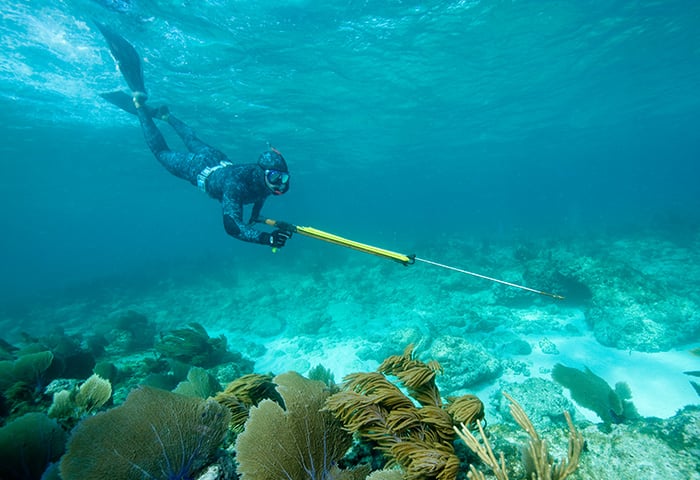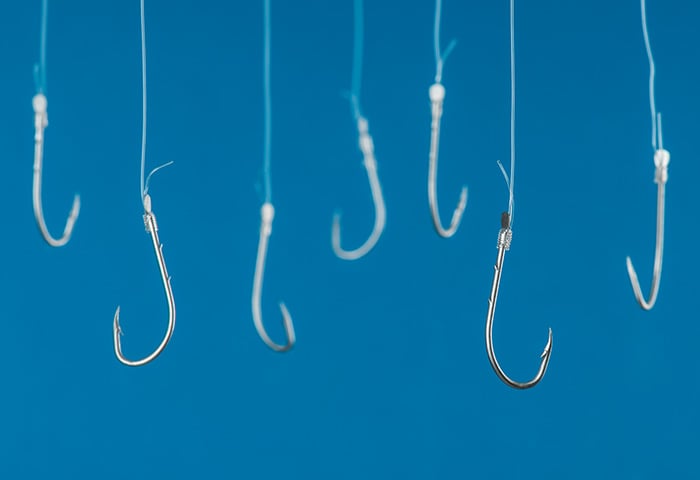What is catfishing?
Catfishing is the act of lying about one’s real identity to mislead someone looking for romance on the internet. The catfisher will lie about their gender, age, or location and then use social engineering techniques to extort money or solicit information that can lead to identity theft.
Catfishing online can occur in any situation where there is no trustworthy third party to verify the person’s identity. But unlike other forms of phishing, it almost always occurs on a social media site, online dating platform, or messaging app, where personas can be invented quickly and easily.
Catfishing attacks are particularly common threats because they don’t require any technical expertise. Anyone can set up a convincing catfish ploy in just five minutes by uploading a fake profile picture of a particularly attractive person and inventing details of a fictitious life.

Just knowing the catfishing definition is a good first step toward protecting yourself, but by knowing the specific signs of catfishing to watch out for, you can help ensure you’re one step ahead of scammers and fraudsters.
11 catfishing warning signs
Catfishing is most prevalent on dating sites and social media. When meeting someone new online, especially on a dating site, ask yourself if they could be a catfisher and watch out for signs of catfishing.
Here’s how to know if someone is catfishing you:
1. Too good to be true
Attention from a highly successful person feels really good. Catfishers want to lure people in, right? That’s why they often look like stunningly handsome people with high-paying jobs. Maintain a healthy amount of doubt when talking to someone new. If you don’t find yourself relating to them personally, you should doubt them.
2. They have everything in common with you
You can also relate to someone too much. Catfishers will often try to forge a fake connection with you by feigning similar interests and life experiences that make you feel understood and accepted. When someone focuses excessively on you or purports to share practically everything in common with you, they’re likely trying to manipulate you emotionally.
3. Deeply personal and over-the-top
People naturally crave connection. So, when faced with the prospect of opening up, you might find yourself responding very strongly. And this is another way catfishers try to maliciously tug at your heartstrings. Once you’ve shared deeply personal things, it builds a false feeling of trust and makes you more likely to fall for scams.
4. The relationship moves fast
They might start making plans about how you’ll live together and how you’ll spend your time as a couple. Eventually, they’ll ask you to invest in some stocks. You think the website looks shady, but nobody’s ever been this nice to you before and you’ve been telling your friends you think you’ve found your soulmate. Next thing you know, your computer could be infected with ransomware and a demand for a $100,000 payment to unlock your files.
5. Little presence on social media
Many Instagram users also have Twitter or other social media accounts, so you can verify that a person is real by looking across different platforms. Catfishers want to leave as little of a breadcrumb trail as possible, so they likely won’t have any other social media accounts.
6. They never want to (video) call
To protect their real identity, catfishers will repeatedly say they aren’t ready to video chat or meet up… “but let’s do it next week, okay?” Some people want to take things slow, and that’s okay. Shyness over video calling is not a red flag in and of itself. You can differentiate a catfish because they use purposeful, driven relationship talk — but they never have the time to video chat.

7. They avoid meeting up
For the same reason they don’t want to video call, catfishers normally won't meet you in person, because they’re seldom the person in the picture. In rare cases, the person in the picture does show up — but they’re still trying to scam or even hurt you. That’s why you should always think about meeting in public during the day.
8. Their story has some holes
The only reason someone would have trouble keeping their story straight is if they’re lying. But experienced catfishers will be able to smooth over holes or contradictions. And unless you’ve got your guard up, you’ll be inclined to believe everything they say because deep down you want to.
9. A new or recently created profile
If the profile has little to no activity on it, it was probably created for the sole purpose of tricking others. A bio with strange, unnatural language is usually a telltale sign. You can go one step further and check their friends and their interactions on the platform. A lack of friends and photos indicates a fake account.
10. Stolen or fake pictures
Using stolen or fake profile pictures of incredibly attractive people is the most common catfishing tactic. But it can also be a great way to weed out scammers and fraudsters once you know to look out for the following giveaways:
-
They look alluring and exceptionally attractive, like they’re a model in an ad.
-
It’s hard to tell the geographical location.
-
The person is in the seat of an expensive car.
-
The pictures don’t feel personal — no friends or family are visible.
-
Expensive hobbies and accessories are shown.
When in doubt, perform a reverse image search on Google to determine more conclusively if the picture is stolen.
11. Asking for money
Asking for money is the most obvious red flag, as financial gain is usually a catfisher's main goal. No matter what anyone says, and what the “emergency” is, it’s deeply inappropriate to seek personal donations or loans from someone you barely know. And catfishers know this, so they might also try to cloak it in the form of an investment or stock opportunity.

How to protect yourself from catfishing?
You can protect yourself from people trying to trick you online by googling them, requesting an impromptu video chat, and refusing to send photos and personal information. You can also help keep your children safe online by restricting them to safe messaging apps that don’t allow users to send images or documents, and teaching them about the perils of oversharing online.
Here’s a more in-depth look at how you can check for catfishers:
Do a reverse image search
You can perform a reverse image search by uploading an image to Google to see all the websites where that image appears. Take a screenshot of the other person’s profile pic, and then follow these steps to use Google’s reverse image search tool:
-
Go to Google images.
-
Click the camera icon to search by image.
-
Upload the file by dragging it into the box.
It’s most likely the person is telling the truth if you see multiple social media profiles with the name they gave. If you get other unrelated websites or profiles with different names, you know they’re lying.
Video chat
After chatting and getting to know each other for a little while, it’s normal to progress to a video chat. A catfisher will say everything they can to delay a video chat — until it just never happens. Worse, they may push back and make you feel awful for asking. So, ask for a video chat — and make it spontaneous — to see if they are who they say they are.
Meet in person
The in-person meetup is the ultimate kryptonite for the catfisher. It exposes their true identity, and the jig is up. Or perhaps they’re not able to meet you because they don’t live where they claim to. Either way, requesting an in-person meet-up is a great way to identify internet scammers and time-wasters.
Don't send sensitive photos
Don’t send sensitive photos, even if you’re sure they’re a real person. When your face appears clearly in a risqué photograph, it can be used to blackmail or humiliate you. Even if they’re not malicious scammers, people can turn very ugly after a breakup, so be careful with the kinds of pictures you send.
Trust your gut
A gut feeling comes from a mix of intuition and experience. When a person walks into your life and begins offering the most affection you’ve ever received, the situation will likely feel unsettling. Or perhaps there’ll be something small and imperceptible about the stories they tell, which set alarm bells ringing. Pay attention to these feelings and trust your instincts.
Maintain your privacy
You can chat about common interests, the weather, and aspirations without bringing up any concrete details. Maintaining a healthy degree of privacy helps prevent efforts to steal your identity or hack your accounts.
Keep the following topics secret when initially meeting new people online:
-
Names of cafes or restaurants you visit
-
Your address
-
Any financial information
-
Names of friends and family
-
Upcoming travel dates
-
Your date of birth
Never give money to Internet strangers
Refusing to send money to strangers you only know online is one of the most important steps you can take to prevent catfishing. Even if you’ve followed all of the advice above, skillful scammers can still slip through. As a last line of defense, never send money to someone who isn't a close friend or family.
 Catfishing scams often happen on social media sites, dating platforms, or messaging apps.
Catfishing scams often happen on social media sites, dating platforms, or messaging apps.
Why is it called catfishing?
The term “catfishing” originates from the 2010 documentary Catfish about a romance scam on social media. The catfishing definition refers to the use of catfish in the fishing industry to chase live cod during shipping to ensure better-quality fish by keeping them active.
Why do people catfish?
People generally catfish to scam people out of their money or steal their identities. But there are a small number of people who catfish for reasons completely unrelated to financial gain. So, why do these people catfish?
Here are some of the motivations for catfishing:
Sometimes catfishing can even start out as innocent role-playing that turns sour when getting a kick out of faking a persona slips into seriously misleading someone over a longer period. As soon as it moves into the realm of emotional manipulation, harassment, or fraud, it’s a clear case of catfishing.
Examples of catfishing
One of the most famous examples of catfishing on social media or dating apps is the Tinder Swindler, about whom a Netflix documentary was made. He convinced women on Tinder that he was the son of a billionaire, concocting exciting stories of wealth and intrigue. Through his bogus profile and stories, he conned numerous women out of an estimated total of $10 million.
Another shocking catfishing case was the abduction of Alicia Kozakiewicz. She was a young teenager who believed she was talking to a boy her own age; but when they finally met up in person, it turned out to be a man in his late 30s who proceeded to kidnap her.
Protect yourself against catfishing and other online scams
Dating scams aren’t the only type of imposter fraud to watch out for. You should also be on the lookout for swindlers posing as government agencies, businesses, or tech support workers.
Fortunately, robust digital security such as AVG AntiVirus FREE offers several safeguards to help protect against online scams. As well as alerting you to shady emails and attachments, AVG AntiVirus FREE helps catch malware and hacking threats in real-time, and more. Get award-winning protection for free today.
.png)
.png)




 Catfishing scams often happen on social media sites, dating platforms, or messaging apps.
Catfishing scams often happen on social media sites, dating platforms, or messaging apps.






